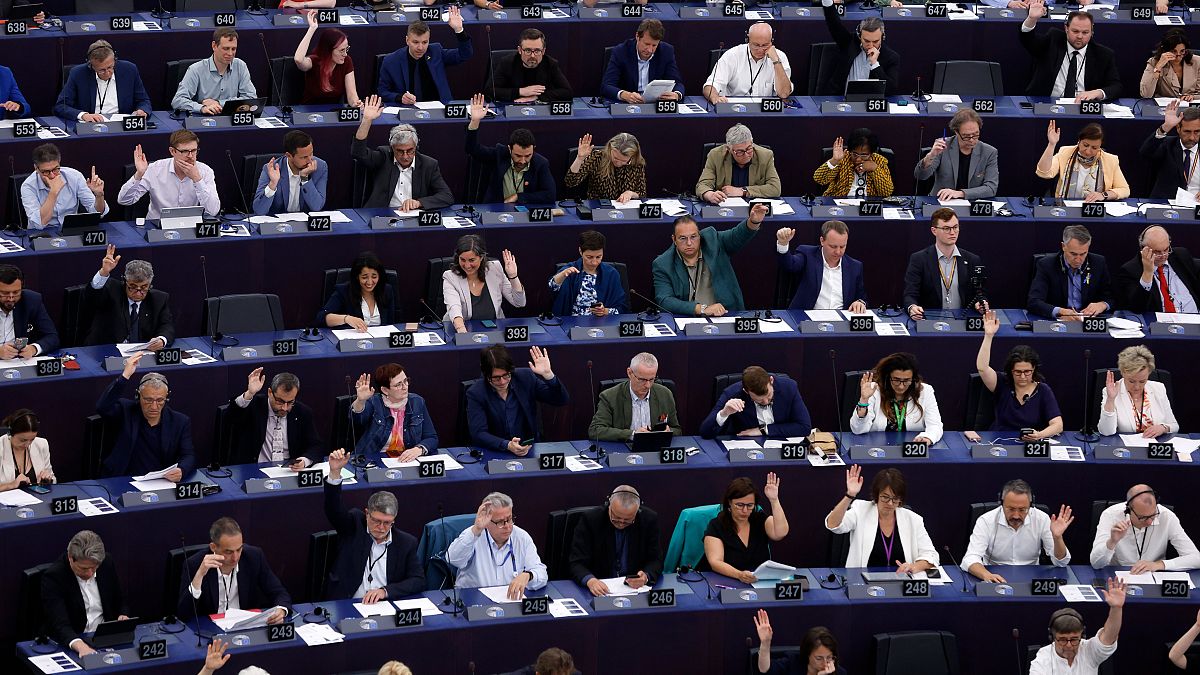Germany and Italy seem likely top dogs in the EU’s most influential political groups – but where is France?
The structure of the new European Parliament still isn’t finalised – but already it’s becoming clear which delegations will dominate the major political blocs.
Euronews analysis shows the German delegation as the most significant player in the bloc’s biggest grouping, Ursula von der Leyen’s European People’s Party (EPP), and it also dominates the much smaller Green party.
Italy will hold significant sway over the centre-left socialists and right-wing Conservatives and Reformists movement (ECR), after a strong poll performance by the Democratic Party and Giorgia Meloni’s ruling Brothers of Italy.
But France is conspicuous by its absence from the major pan-EU coalitions that determine how funds and power flow in the European Parliament.
The biggest groups – and the biggest national delegations within them – can expect to get first pick of plum positions such as committee chairmanships, and the right to hold the pen on major legislation.
All together, Euronews’ analysis allocates all major parties, all but a few dozen of the 720-strong cohort of MEPs, to one of the seven major political clusters likely to emerge from the talks that will take place in the coming weeks.
France’s Republicans party has just six MEPs in the EPP. The centre-right party of Charles de Gaulle and Nicolas Sarkozy is currently imploding after its leadership sought to cut a deal with the far-right in national parliamentary elections.
On Wednesday, the Republicans’ president Eric Ciotti blockaded himself in its Paris headquarters, and refused demands from multiple party grandees for him to stand down.
The centrist list of President Emmanuel Macron garnered 13 EU lawmakers, making it dominant within the liberal Renew group – but Macron was trounced by the far-right National Rally of Marine Le Pen, forcing him to call snap elections.
In contrast, the results spell good news for Poland, which can boast a strong cohort of 23 MEPs in the EPP and 20 in the ECR.
After many years of perceived democratic backsliding, Donald Tusk’s centre-right government took office last year, to loud cheers from Brussels.
The promising results are likely to give an extra push to Warsaw’s EU influence, while the leadership in Berlin and Paris are licking their wounds from an electoral beating.
Not yet finalised
While polls in the European elections closed on Sunday, much remains to be settled.
EU groups have not yet formally decided on their composition – potentially meaning new alliance will still be forged, or problematic partners jettisoned.
Renew are set to take a decision on whether to keep the four MEPs of Mark Rutte’s VVD party, which has controversially entered a coalition with the Dutch far right.
The five Dutch and German lawmakers from the pan-European Volt party could choose to continue to sit with the Greens, or opt for Renew. (They’re not shown as either in the charts above).
Uncertainty
And there’s particular uncertainty about how the extremes might coalesce.
The 30 lawmakers of the National Rally constitute the biggest single party in the European Parliament, and it could grow even bigger if joined by the handful from Reconquest, another French party that’s now in dispute with its own leader.
They’d likely dominate any far-right grouping – and some hope that could also scoop up Hungary’s Fidesz, Viktor Orban’s increasingly authoritarian ruling party, or Poland’s Law and Justice.
While numerically the radical right can boast over 100 MEPs, it’s not clear if that will translate into an extremist supergroup, or if they’d gain access to influential positions within the parliament administration.
There are significant differences of opinion between Warsaw and Budapest about key policy issues like Ukraine.
Germany’s AfD was booted out of the EU’s far-right grouping after its lead candidate Maximilian Krah made remarks perceived as sympathetic to Nazi-era SS paramilitaries.
Likewise, the 60-odd MEPs on the parliament’s left still need to decide how to gather.
There are some significant leftist delegations looking for a home – including an alliance led by Germany’s Sahra Wagenknecht, Italy’s Five Star Movement, and the Smer party of Slovakian Prime Minister Robert Fico, which was recently suspended from the socialist group.

